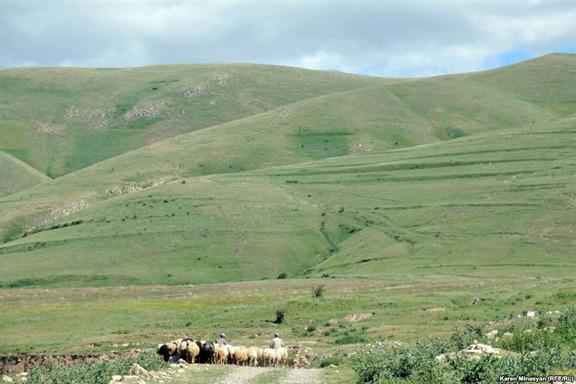Dangers of Iran Land Lease Exposed
- (0)
A potential and controversial deal to lease 800,000 hectares of land in the Syunik Province to Iran to be used as grazing pastures for Iranian livestock has far-reaching geopolitical ramifications.
In an article by James Brooks for the Moscow Times environmentalists and activists denounce the Armenian government’s intention to lease such a large swath of land, expressing fears that the critical area bordering Iran and Azerbaijan on both sides could become populated by ethnic Iranians of Azeri descent.
Below is an excerpt from Brooks’ article for the Moscow Times.
The sheep would largely graze in Armenia’s southernmost region, Syunik. Long and as narrow as 30 kilometers wide in some places, Syunik is Armenia’s lifeline to Iran. But it is strategically vulnerable, sandwiched between two territories of Azerbaijan.
Although Syunik is Armenia’s second-largest region, it is also one of its least populated. With 15 percent of Armenia’s land area, Syunik has less than 5 percent of Armenia’s people. The population dropped in the late 1980s after ethnic fighting forced an Azeri minority to flee to Azerbaijan and northern Iran.
Without a large local population to draw on, the Iranian sheep project would mean importing Iranian shepherds and possibly their families. Depending on the age of slaughter — for lamb or mutton — an annual export of 2.5 million sheep could mean an Iranian flock of 5 million sheep in southern Armenia. Given the region’s steep terrain, it would be hard for one shepherd to watch more than 500 sheep. So, back-of-the-envelope calculations point to as many as 10,000 Iranian shepherds. Where would the shepherds come from?
The memorandum of understanding was signed between Syunik and the neighboring Iranian region, a place with a name that sounds ominous to many Armenians — Eastern Atrapatakan, or Eastern Azerbaijan. With a population 20 times that of Syunik, Eastern Atrapatakan is a keystone for the northern Iran’s Azeri minority, about 17 million people.
The Iranian sheep deal could come with as many 10,000 ethnic Azeri shepherds, their families, and their watchdogs. But there is another wrinkle: Over the past 20 years, the withdrawal of Armenian shepherds from the mountain pastures has allowed the nation’s wolf population to surge. Armenian authorities now pay a $275 bounty for each wolf shot. So it stands to reason that Iranian shepherds would carry rifles to protect their flocks from wolves and other predators.
In a nutshell, Armenians say, the Iranian sheep deal would mean several thousand ethnic Azeri men, most of whom are armed with rifles, infiltrating into a strategic area.
“With the sheep, a couple of thousand people may come to Armenia, and may live in places that are strategically important for Armenia,” said Evoyan, the environmentalist. “It’s not only about the employment. As I said, it’s about the informal migration of other nationalities to Armenia that is not a strategically right choice for Armenia.”
“I remember how the Azerbaijanis were quietly taking control of Syunik during the Soviet years,” environmentalist Silva Adamyan told Armenia Now. “We have liberated it. And now, we want to give it to them again? Can’t we really understand that it is the same Azeris — citizens of Iran — who would be coming back to Syunik with their families, and so the blood we shed for those lands would turn out to be for nothing?”



















